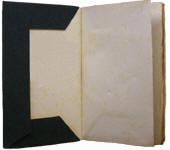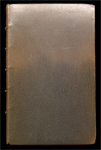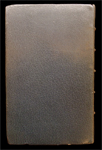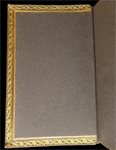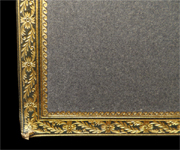100th
MP

|
THE
100th
MONKEY
PRESS |
|
|
|
Limited Editions by Aleister Crowley & Victor B. Neuburg |
|
Bibliographies |
|
Download Texts
»
Aleister
Crowley
WANTED !!NEW!!
|
|
ALICE: AN ADULTERY |
|
Image Thumbnails |
||||||||||||||||||||||||||||||||
|
Title: |
Alice: An Adultery. |
|
||||||||||||||||||||||||||||||
|
Variations: |
|
|||||||||||||||||||||||||||||||
|
Publisher: |
Privately published.1 |
|||||||||||||||||||||||||||||||
|
Printer: |
|
|||||||||||||||||||||||||||||||
|
Published At: |
London. |
|||||||||||||||||||||||||||||||
|
Date: |
1903.1 |
|||||||||||||||||||||||||||||||
|
Edition: |
1st Edition. |
|||||||||||||||||||||||||||||||
|
Pages: |
iv + xx + 96. |
|||||||||||||||||||||||||||||||
|
Price: |
Subscriber price was ten shillings and sixpence. Published price was 21 shillings.1 |
|||||||||||||||||||||||||||||||
|
Remarks: |
Crowley had the original holograph manuscript for Alice. An Adultery bound in blue levant morocco by Zaehnsdorf with a half morocco slip case. Manuscript written in red ink, with pages here and there in black ink and pencil, and has many manuscript additions and deletions. 138 pages, quarto.4 |
|||||||||||||||||||||||||||||||
|
Pagination:3 |
|
|||||||||||||||||||||||||||||||
|
Contents: |
- Introduction By The Editor - A Brief Critical Essay on Alice an Adultery - White Poppy - Messaline - California - Margaret - Alice: An Adultery - The First Day - The Second Day - The Third Day - The Fourth Day - Reincarnation - The Fifth Day - The Sixth Day - The Seventh Day - The Eighth Day - The Ninth Day - The Tenth Day - The Eleventh Day - The Twelfth Day - Red Poppy - The Thirteenth Day - The Fourteenth Day - The Fifteenth Day - The Sixteenth Day - The Seventeenth Day - Love And Fear - The Eighteenth Day - The Nineteenth Day - The Twentieth Day - The Twenty-First Day - The Twenty-Second Day - The Twenty-Third Day - The Twenty-Fourth Day - The Twenty-Fifth Day - The Twenty-Sixth Day - Under The Palms - The Twenty-Seventh Day - The Twenty-Eighth Day - The Twenty-Ninth Day - The Thirtieth Day - A Day Without A Number - The Thirty-First Day - The Thirty-Second Day - The Thirty-Third Day - The Thirty-Fourth Day - The Thirty-Fifth Day - The Thirty-Sixth Day - Lethe - The Thirty-Seventh Day - The Thirty-Eighth Day - The Thirty-Ninth Day - The Fortieth Day - The Forty-First Day - The Forty-Second Day - At Last - The Forty-Third Day - The Forth-Fourth Day - The Forty-Fifth Day - The Forty-Sixth Day - The Forty-Seventh Day - The Forty-Eighth Day - The Forty-Ninth Day - The Fiftieth Day - After |
|||||||||||||||||||||||||||||||
|
Author’s Working Versions: |
|
|||||||||||||||||||||||||||||||
|
Other Known Editions: |
|
|||||||||||||||||||||||||||||||
|
Bibliographic Sources: |
|
|||||||||||||||||||||||||||||||
|
Comments by Aleister Crowley: |
...I had a vague idea of getting a hut and a native girl, and devoting myself to poetry of the most wholesome kind with corresponding Magick. However, at the hotel was an exquisitely beautiful American woman of Scottish origin. She was ten years older than myself and had a boy with her just entering into his teens. She was married to a lawyer in the States and had come to Hawaii to escape hay fever. ...The woman was herself worthless from the points of view of the poet. Only very exceptional characters are capable of producing the positive effect; but it is just such women as Alice who inspire masterpieces, for they do not interfere with one’s work. Passionately as I was in love, and crazily as I was behaving in consequence, I was still able to make daily notes of the progress of the affair with the detached cynicism of a third party. I took her with me to Japan, but there was not enough in her character to count “the world well lost for love”. Exactly fifty days after I had met her she beat it back to her “provider”; and I understood immediately why my subconsciousness had insisted on my scribbling the details of our liaison in my diary. The departure of Alice inspired me to write the story of our love in a sonnet sequence. Each day was to immortalize its events in poetry. This again was one of my characteristically crude ideas, yet the result was surprisingly good — much better, perhaps, than I ever thought, or think now. No less a critic than Marcel Schwob called it “a little masterpiece”. And many other people of taste and judgment have professed themselves in love with it. Possibly the simplicity of its realism, its sincere and shame-free expression of every facet of my mind, constitute real merit. It is certainly true that most people find much of my work hard to read. The intensity of my passion, the profundity of my introspection, and my addiction to obscure allusions, demand the reader serious study, that he may grasp my meaning; and subsequent re-reading after my thought has been assimilated; until, no intellectual obstacle interrupting, he may be carried away by the current of my music and swept but it into the ocean of ecstasy which I myself reached when I wrote the poem. I am aware that few modern readers are capable of settling down deliberately to decipher me. And those who are may for that very reason be incapable of the orgiastic frenzy. Scholarship and passion rarely go together. But my muse is the daughter of Hermes and the mistress of Dionysus. — The Confessions of Aleister Crowley. New York, NY. Hill and Wang, 1969. Page 226-227. ______________________________
At “Marlborough” we found the conditions for work very favourable. The first step was to get rid of all other preoccupations. I revised Tannhäuser, wrote an introduction, typed it all out and sent it to the press. I put aside Orpheus and left aside Alice, An Adultery to ripen. I did not think much of it; and would not publish it until time had ratified it. — The Confessions of Aleister Crowley. New York, NY. Hill and Wang, 1969. Page 238. ______________________________
Marcel Schwob excited my unbounded admiration. He was admittedly the finest French scholar of English. ...Even after all these years I glow with boyish pleasure to recall his gracious, unassuming acquiescence in my impertinent existence and his acknowledgement of my Alice, An Adultery as a “little masterpiece”. — The Confessions of Aleister Crowley. New York, NY. Hill and Wang, 1969. Page 342. ______________________________
I remember giving the manuscript of Alice to Kelly and a girl named Sybil Muggins to read, and they agreed that no really nice woman would have kissed a man so early as the thirteenth day of his wooing. I must confess to having been taken a little aback, especially as Sybil Muggins was Haweis’s mistress. — The Confessions of Aleister Crowley. New York, NY. Hill and Wang, 1969. Page 350. ______________________________
...an old friend of Gerald’s (Kelly) and mine, Ivor Back, at this time a surgeon at St. George’s, to make up the house party. Ivor Back is one of the most amusing companions possible, to those who can stand him. He knows a good deal about literature and had published in The Hospital magazine some of the poems in which I had celebrated various diseases. I dedicated my In Residence, a collection of my undergraduate verses, to him, and he collaborated with me to a certain extent in the composition of various masterpieces of the lighter kind. He and Gerald are also responsible for numerous improvements in the preface to Alice, An Adultery. — The Confessions of Aleister Crowley. New York, NY. Hill and Wang, 1969. Page 405-406. ______________________________
Ivor and I, with some assistance from Gerald, collected such of these manuscripts as had not been destroyed, and with “the Nameless Novel”, we composed a volume (Snowdrops from a Curate’s Garden.) to carry on the literary form of White Stains and Alice; that is, we invented a perpetrator for the atrocities. — The Confessions of Aleister Crowley. New York, NY. Hill and Wang, 1969. Page 413. ______________________________
There remain my narrative and dramatic books on love. The Tale of Archais is simply jejune; I apologize and pass on. The Mother’s Tragedy, “The Fatal Force”, Jezebel, Tannhäuser, all treat love not as an object in itself, but on the contrary, as a dragon ready to devour any one less than St. George. Alice is partly excusable, because it is really a lyric, when all is said and done. In any case, I do not value the book very highly. It is ridiculous to make anything important depend on the appetites of an American matron. — The Confessions of Aleister Crowley. New York, NY. Hill and Wang, 1969. Page 556-557. |
|||||||||||||||||||||||||||||||
|
Reviews: |
[commenting on the book being published by the Society of the Propagation of Religious Truth.] We confess to being so dense as to miss the essentially religious purpose of the book . . . . But the power of many of the sonnets is undeniable. . . . For the perfect art of these lyrics, for their tender music, we have nothing but admiration. . . . . —The Glasgow Herald, date unknown. ______________________________
The Society for the Propagation of Religious Truth, Boleskine, Foyers, Inverness, has sent out a book in paper covers (5s. net) containing a sequence of sonnets, interspersed with pieces in lighter lyrical forms, which tell in rather spasmodic and sensational lines a story of unlawful love, and bear the appropriate title "Alice: An Adultery." The sonnet can carry a great deal; and yet these read as if the form were overloaded; while, on analysis, their freight turns out to be more passion and philosophy than poetry power. —The Scotsman, 22 December 1904. ______________________________
The author of this volume has an extremely “guid conceit o’ himsel’,” but a perusal of his poetry convinces us that it is ill-founded. He has a good deal of talent of a weak, neurotic, lyrical kind, but it is purely derivative, manner and form coming almost undisguised from the greater (and least English) of the pre-Raphaelites. For matter the author has turned to some un-savoury reminiscences of a chance acquaintance, reminiscences which plead to be forgotten, and which none but the very shameless would dare to put into print. The book is mostly about kisses, and to show the reader what a lot the author can say about them we venture to quote a stanza:
One kiss, like moonlight cold Lightning with floral gold The lake’s low tune. One kiss, one flower to fold, On its own calyx rolled At night, in June! One kiss, like dewfall, drawn A veil o’er leaf and dawn— Mix night, and noon, and dawn, Dew, flower, and moon.
Which seems to us (who do not pretend to be learned in these matters) a considerable deal for a single kiss to effect. Most of the book is in need of what a poet has called “purging fire.” One or two lines are good. One or two stanzas have the meaningless, derivative prettiness of the fragment we have quoted. For the rest, we will content ourselves with applying to the author the three words he applies to the late Poet Laureate. —The London Daily News, 18 April 1905. ______________________________
He has a good deal of talent of a weak, neurotic, lyrical kind, but it is purely derivative. . . . For matter, the author has turned to some unsavoury reminiscences of a chance acquaintance, reminiscences which plead to be forgotten, and which none but the very shameless would dare to put into print. . . . Most of the book is in need of what a poet has called “the purging fire.” One or two single lines are good. One or two stanzas have a meaningless derivative prettiness. . . . —The Daily News, date unknown. ______________________________
These love songs of his have a wonderful ardour, and almost
Sapphic fury. They flash and shine with images that are like
little streaks of flame. . . . The verse with which the book
opens has all the hard brilliance and the luster which are
characteristic of the writer’s work. The opening picture breaks
on the senses like a shaft of sudden sunshine. . . . Among many
things that occur to one in reading Mr. Crowley’s verses is
their singular disseverance from the things of the day, their
entire lack of what is called “The Modern Note” in poetry. We
must think that he deliberately shut his eyes to the writings of
the intimate, romantic, impressionist school, or how else could
so susceptible an artist have escaped its infection? For the rest: great metrical force, rhythms so violent as almost sometimes to exhaust themselves, and, in some of the later work, a curious employment in his philosophy of paradox... —The English Review, date unknown. |
|||||||||||||||||||||||||||||||


